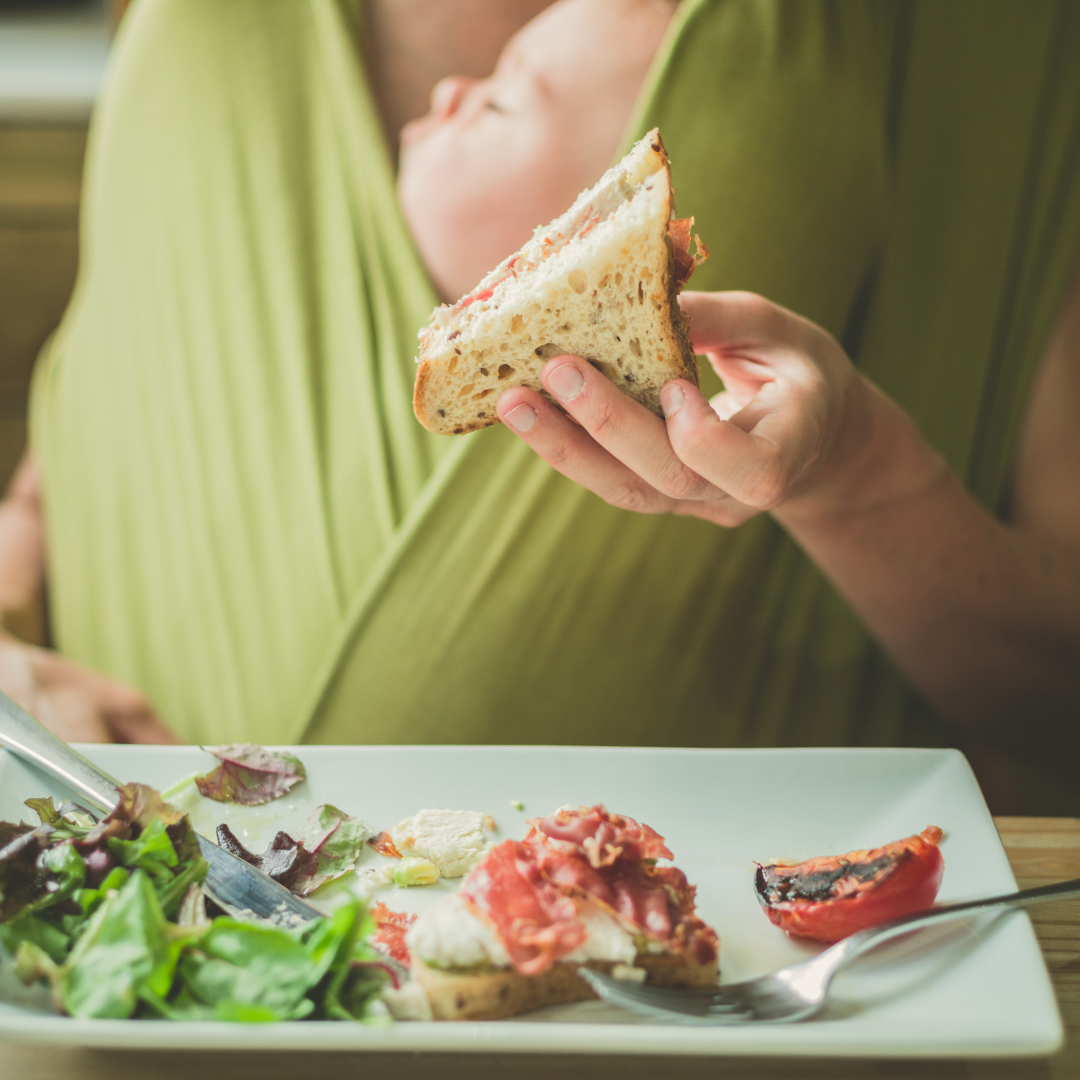Does Breastfeeding Make You Hungry?
This post may contain affiliate links. As an Amazon Associate, I earn from qualifying purchases.
Yes, breastfeeding will certainly make you hungry!
Mamas, you may notice that breastfeeding makes you hungry during the 1st few months. Especially if you choose to exclusively breastfeed your baby.
Breastfeeding uses up a lot of energy from your body, about 500 additional calories per day. So, you are bound to feel hungry A LOT!
As a new mom, are you feeling ravenous and are ready to eat everything in sight but the kitchen sink? Let me be the first to tell you that breastfeeding can definitely do a number on you.
You are perfectly normal, and there is nothing wrong with you.
In this article, I will answer all your burning questions about why breastfeeding makes you hungry. So hold your horses!
RELATED READ: NURSING ON THE GO: THE BEST PACKAGED SNACKS FOR BREASTFEEDING MOMS
Why am I always hungry and thirsty when breastfeeding?
Breastfeeding is beneficial to you and your baby. If you can, please go right ahead with this method of feeding. It provides all the nutrients your baby needs to grow healthy- whether it’s with exclusive nursing, use of a pump, or a mix.
To answer the question above, here are a few reasons:
Reason #1: Your body needs to satisfy the hunger to produce milk while breastfeeding
Your body requires a lot of energy to produce breast milk for nursing, so you should eat a well-rounded diet often to provide that energy.
Unfortunately, breastfeeding hunger comes with extra cravings, some of which may be for not-so-healthy options like fries, burgers, potato chips, cookies, ice cream, and cake.
These processed foods contain large amounts of sugar, causing a spike in your blood sugar. It then crashes down soon afterward, leaving you feeling very hungry.
The problem with a sudden drop in your blood sugar is that your body does not need more food but feels like it does. So you tend to overeat, which can cause you to gain some weight due to the extra calories.
To curb this vicious cycle, you should choose healthy alternatives of carbohydrates for energy (i.e. whole grains) and load up on protein and fiber to leave you feeling fuller for longer an help keep your blood sugar stable. However, don’t be afraid to indulge either- we’re not here to scare you into dieting! Actually- the exact opposite 🙂
Reason #2: Hormonal fluctuations are responsible for hunger while breastfeeding
Your hormones play a critical role in increased hunger and metabolism, so some breastfeeding mamas will experience increased appetite with the hormonal changes.
For example, breastfeeding causes a rise in your prolactin levels. Prolactin is the hormone responsible for producing milk. At night, your body has increased demand for it.
This spike in prolactin increases hunger, especially for carbohydrates, which helps you overcome a lack of energy due to sleep deprivation.
Another hormone called Ghrelin, also known as the hunger hormone, is affected by your sleep patterns.
Sleep-deprived breastfeeding mothers tend to have higher ghrelin levels, which means more hunger.
Welcome to your many months of not getting enough sleep as a postpartum nursing mom. I promise it’ll get better over time!
Reason #3: Being sleep-deprived leads to stress
Breastfeeding a newborn is stressful- particularly for new moms. Also add not getting enough sleep and the stress increases. Unfortunately, stress causes an increase in cortisol levels, and this hormone increases your hunger.
This is why you need to be intentional about your food choices. Meals with higher fiber, healthy fats, and protein can really help reduce your hunger. Also, adding healthy veggies and fruits will provide the nutrients necessary for producing milk.
Reason #4: Your body needs more nutrients
Your body needs lots of nutrients to produce breast milk. So, you will feel hunger signals telling you to eat more food to get the required nutrients.
Breastfeeding mothers need nutrients like carbohydrates, protein, healthy fats, oils, and minerals such as iron, folate, vitamin B12, calcium, etc.
Load up on complex carbs like brown rice and lean proteins, beans, fruits, and veggies, which will supply the nutrients and help you stay full.
You can continue to take your prenatal vitamins while you are breastfeeding. But the majority of your nutrients should come from the foods you eat.
How to eat healthfully when you are hungry while breastfeeding
You do not need to eat a special diet when breastfeeding your baby. However, your meals should be healthy, balanced, and wholesome.
You should always choose meals from all the major food groups such as carbohydrates, protein, and healthy fats.
Eating various nutrient-dense foods will get the nourishment you and your baby need. Since every food has a different array of protein, carbohydrates, fats, vitamins, and minerals, your goal is to choose an assortment of foods from each group every day:
- Vegetables and fruit: Choose different varieties each week
- Proteins: Lean meats, fish, nuts, low-fat dairy, eggs, seeds, legumes, and beans
- Whole grains: Whole grain bread and cereals, brown rice, quinoa, etc.
- Healthy fats: Fatty fish, nuts/nut butter, seeds, avocado, and plant oils like olive oil
RELATED READ: TOP 10 FOODS TO INCREASE MILK SUPPLY
Do not forget to drink water when breastfeeding!
Breastfeeding can make you thirsty, so drink extra fluids throughout the day.
When your baby initiates the sucking reflex, your oxytocin levels increase. This causes your milk to start flowing and also stimulates thirst. You should always drink when you are thirsty.
The best way to tell if you are drinking enough water is the appearance and smell of your urine.
If it is dark yellow in color and has a strong smell, that is definitely a sign of dehydration, and you need to drink more water.
Remember, dehydration can affect breast milk production because breast milk is more than 80% water.
So, drink up!
RELATED READ: BEST WATER BOTTLE FOR BREASTFEEDING: TOP 5 TO KEEP MAMA HYDRATED!
Indulge in nourishing snacks to reduce hunger while breastfeeding
Snacking is perfect when you have just a few minutes to spare between the time it takes for your baby to rest and before he requires your attention.
Eating various nutritious snacks throughout the day is a great way to satisfy your hunger and fuel your body.
Snacks should also be easy to put together and boost your breast milk supply.
Below are some snack options for you to try while breastfeeding
- Trail mix with healthy nuts and dried fruits
- Granola bars without refined sugar
- Turkey wrap with veggies such as cabbages, lettuce, spinach
- Cheese & Crackers
- Peanut Butter & Jelly Sandwich
- Avocado Toast made with whole-grain bread
- Hard-Boiled Eggs
- Fruits with nut butter such as apple & peanut butter, banana with Peanut Butter
- Fruit/Veggies with yogurt dips
- Chia pudding
- Whole Wheat Bagels with Cream Cheese
- Yogurt
- Tuna with Crackers
- Muffins (ones not loaded with preservatives and sugar- usually this means home made!)
- Dark Chocolate
RELATED READ: 10 QUICK AND HEALTHY BREASTFEEDING SNACKS IN UNDER 5 MINUTES!
Fear of weight gain due to being excessively hungry while breastfeeding
Can you imagine trying not to gain weight when breastfeeding makes you constantly hungry?
Mommas, do not beat yourself up about any weight you gained during pregnancy or while breastfeeding.
You literally brought another human being into the world.
This is no small feat!
Just make a conscious effort to eat healthy and nutritious meals. Combine this with exercise.
You do not need a gym membership for this. Taking walks, dancing, skipping, and gentle aerobics is fine as long as your doctor has given you the go-ahead.
You will definitely start seeing the excess weight drop gradually.
Is It Safe to Diet While Breastfeeding?
How many of you fell for the saying that exclusive breastfeeding makes you lose weight?
I fell for it too, but I eventually learned that to lose weight, you need to make healthy food choices combined with exercise.
Losing weight while breastfeeding is not the problem, but how you go about it is what matters.
Going on a low-calorie diet may be harmful to both you and your baby. If you drastically reduce your caloric intake, you may inadvertently cause a drop in your breast milk supply.
You should also avoid taking any type of weight loss pills or supplements. These products contain substances that may enter your breast milk and harm your baby. Before choosing a weight loss plan, you should speak to your doctor.
It took a good nine months to put that much weight on, so give yourself at least nine months to get it off and get your body back.
How to use intuitive eating when you are hungry while breastfeeding
How much you need to eat or drink to support your milk production depends on many factors and will look different for everyone. This is where the principles of intuitive eating come in.
Intuitive eating means letting your body guide you on what and how much you eat.
As a breastfeeding mom, your body does not require any specific quantity of food to produce breast milk.
Different bodies have different energy needs depending on your weight, level of activity, and hormones. It is never a one size fits all plan.
Always listen to your body!
You may feel hungry often, and your body receives the signal to get the right amount of food it needs to breastfeed.
Here are a few tips to help lose weight while breastfeeding
Mommas, remember you did not add all the weight you have now in one day, so do not try to lose it all in one day.
The best way to lose weight is through a healthy diet and exercise. Make sure you talk to your healthcare provider for tips, advice, and support.
Below are a few tips to get you started on your weight loss journey:
1. Set realistic goals and be easy on yourself
Losing weight takes time, especially while breastfeeding.
Of course, with a good eating plan and exercise, you should be able to achieve a healthy level of weight loss.
2. Stay away from crash diets
Crash diets are those that promise you to lose 10kg in 10 days.
After delivering a baby, your body needs good nutrition to heal and recover.
Crash diets may be harmful because they lack necessary nutrients and will probably leave you feeling tired.
3. Breastfeed if you can
Breastfeeding your baby during the first 6 months of life (or much longer) has many benefits for both of you when it comes to regulating blood sugar levels and healing.
4. Avoid added sugar and refined carbs
When you are at the grocery store, read the food labels carefully. If sugar is one of the first ingredients on the list, that product is probably better to avoid.
Reduce sugar intake by avoiding processed foods and sticking to whole foods such as whole grains, vegetables, legumes, fruits, meats, fish, eggs, nuts, and yogurt.
5. Avoid alcohol
No quantity of alcohol is safe for babies, and you should not drink at all. If you want to indulge, make sure you time it correctly or supplement a feed if needed.
6. Get moving
Exercise helps you lose weight, especially when combined with eating healthy.
7. Drink enough water
Drinking enough water is vital for weight loss. It increases your sense of fullness and aids your metabolism, leading to weight loss.
Plain water is best, but if you get bored, take unsweetened sparkling or fruit-infused water.
8. Get enough sleep
A lack of sleep can negatively affect your weight.
As a breastfeeding mother, getting enough sleep can be a challenge. Remember to ask for help from family and friends whenever necessary.
In conclusion
Being hungry while breastfeeding is not a bad thing (hunger is never a bad thing- it serves an important function!). It is a way for your body to get the nourishment it needs to provide breast milk to sustain your baby.
As much as possible, stick to healthy food and snacks and stay hydrated by drinking lots of water.
You got this!
And if you still have any questions or concerns about being hungry while breastfeeding, speak to your doctor or nutritionist.
What about you? Are you starving all the time? What foods help you feel nourished? We’d love to hear!







